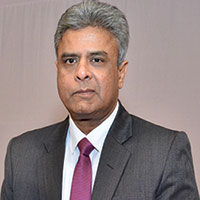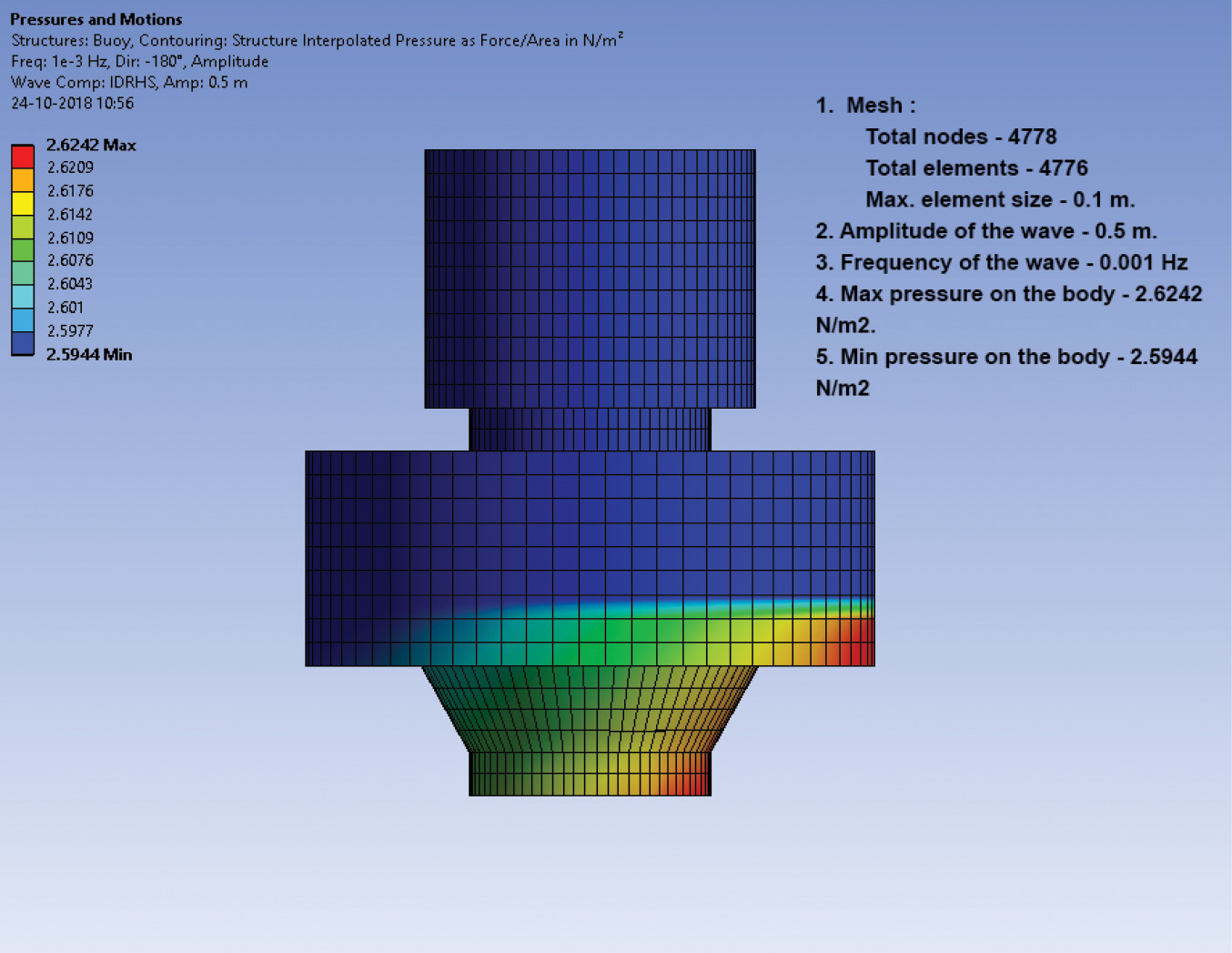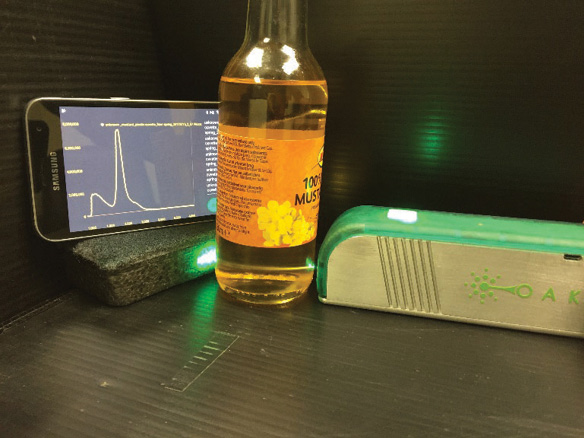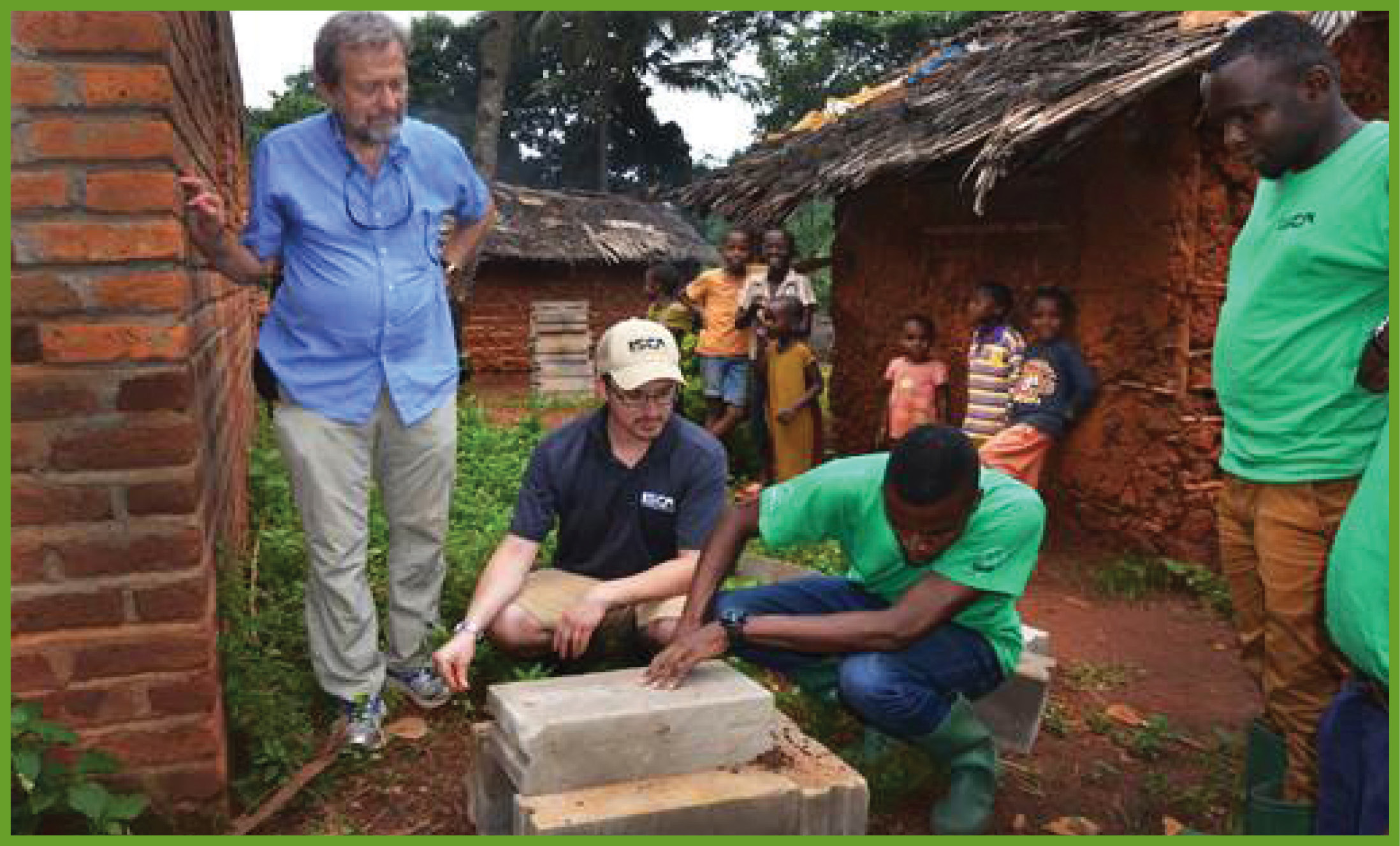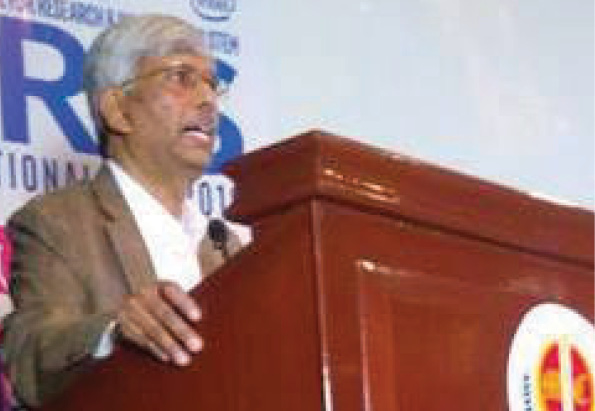In the present era, there is an incredible growth of new nano/micro 2D & 3D manufacturing of electronic and biomedical devices that can improve the performance and functionalities at lower costs through various advanced technologies. To deepen and broaden expertise and knowledge of new 2D & 3D manufacturing of electronic and biomedical devices and innovation to ever-increasing international needs, a workshop titled
Nano/Micro 2D-3D Fabrication, Manufacturing of Electronic–Biomedical Devices & Applications was organized by Kenneth Gonsalves (Indian Institute of Technology-Mandi),
Nan Marie Jokerst (Duke University, Durham) and
Satinder Kumar Sharma (Indian Institute of Technology-Mandi).
Water-Food-Energy-Climate nexus:
A perspective towards a sustainable future
16-21 November 2018
Varanasi, INDIA
Water is the basic element of life, livelihood, food security and sustainable development. Escalating global populations and climate change are placing immense pressure on water and food security. Sustaining a high rate of food production will require innovations in water productivity and soil health, crop cultivar developments, agrochemical inputs, alternative energy sources for irrigation and other cutting-edge agricultural activities. An effective and sustainable solution of global environmental change or climate change requires better understanding and consideration of the linkages and inter-dependencies between climate change, water, energy, food security and sustainability. The purpose of this workshop titled
Water-Food-Energy-Climate nexus: A perspective towards a sustainable future, organized by
Rajeev Pratap Singh (Institute of Environment and Sustainable Development, Banaras Hindu University, Varanasi),
Shannon L. Bartelt-Hunt (University of Nebraska, Lincoln),
Akhilesh Singh Raghubanshi (Institute of Environment and Sustainable Development, Banaras Hindu University, Varanasi) and
Alan S. Kolok (Idaho Water Resources Research Institute) was to address societal challenges in providing water, food and energy security in the future and how the nexus between Climate-Water-Food-Energy can be exploited to address sustainability challenges. Although these challenges are different in India and USA because of the scale of mechanization, resources availability, and other factors, therefore, the workshop addressed differences and similarities in these challenges to develop mutually beneficial solutions.
15th National EEG workshop and Masterclass for Epilepsy Surgery:
A collaborative Indo-American workshop
21-23 November 2018
Varanasi, INDIA

Epilepsy is said to be the commonest neurological disorder after headache. Over 10 million people suffer from epilepsy in India, out of 50 million suffering from this disease worldwide. About 20% of persons suffering from epilepsy have drug resistance (DRE). The only option for DRE is surgery. In addition, epilepsy is shrouded by a lot of stigma thus characterized by a large treatment gap. There is also a limited training in the area of epilepsy at both undergraduate and postgraduate level. In addition, there have been significant achievements in this area over the past decade especially in the area of surgery with a better understanding of networks, biomarkers and neurobiology. The event titled
15th National EEG workshop and Masterclass for Epilepsy Surgery: A collaborative Indo-American workshop organized by
P. Sarat Chandra (All India Institute of Medical Sciences, New Delhi),
Ashwini Sharan (Thomas Jefferson University, Philadelphia) and
Manjari Tripathi (All India Institute of Medical Sciences, New Delhi) is the first Indo-U.S. joint venture fostering a better collaboration for technical advancements and knowledge enhancement in this area.
indo-U.S. Training Program & Workshop on Cancer Proteogenomics
06-11 December 2018
IIT-Bombay, INDIA
Cancer research has been significantly aided by advancements in proteogenomics technologies, where proteomics information derived from mass spectrometry is used to complement genomics using next generation sequencing. With the recent advent of Cancer Moonshot Project, the critical role that proteogenomics can play in improving cancer patient treatment is increasingly being recognized. This event titled
Indo-U.S. Training Program & Workshop on Cancer Proteogenomics organized by
Sanjeeva Srivastava (IIT-Bombay, Mumbai) and
D.R. Mani (Broad Institute of MIT and Harvard, Cambridge) utilized advanced genomic & proteomic technologies and their data from high-quality human biospecimens to identify potentially actionable therapeutic molecular targets. This was a collaborative effort by experts in the fields of proteomics and proteogenomics in cancer research. The program comprised of interactive lectures with case studies, hands-on sessions and demonstrations on proteogenomics aimed at accelerated understanding of cancer. The workshop covered the principles of proteogenomics followed by experimental sessions, where data was processed and analyzed by the participants for proteomics using LC-MS/MS. Hands-on session on computational methods was performed for statistical data analysis of proteogenomics data.
Understanding Cell Biology through Proteomics and Metabolomics
10-11 December 2018
Pune, INDIA
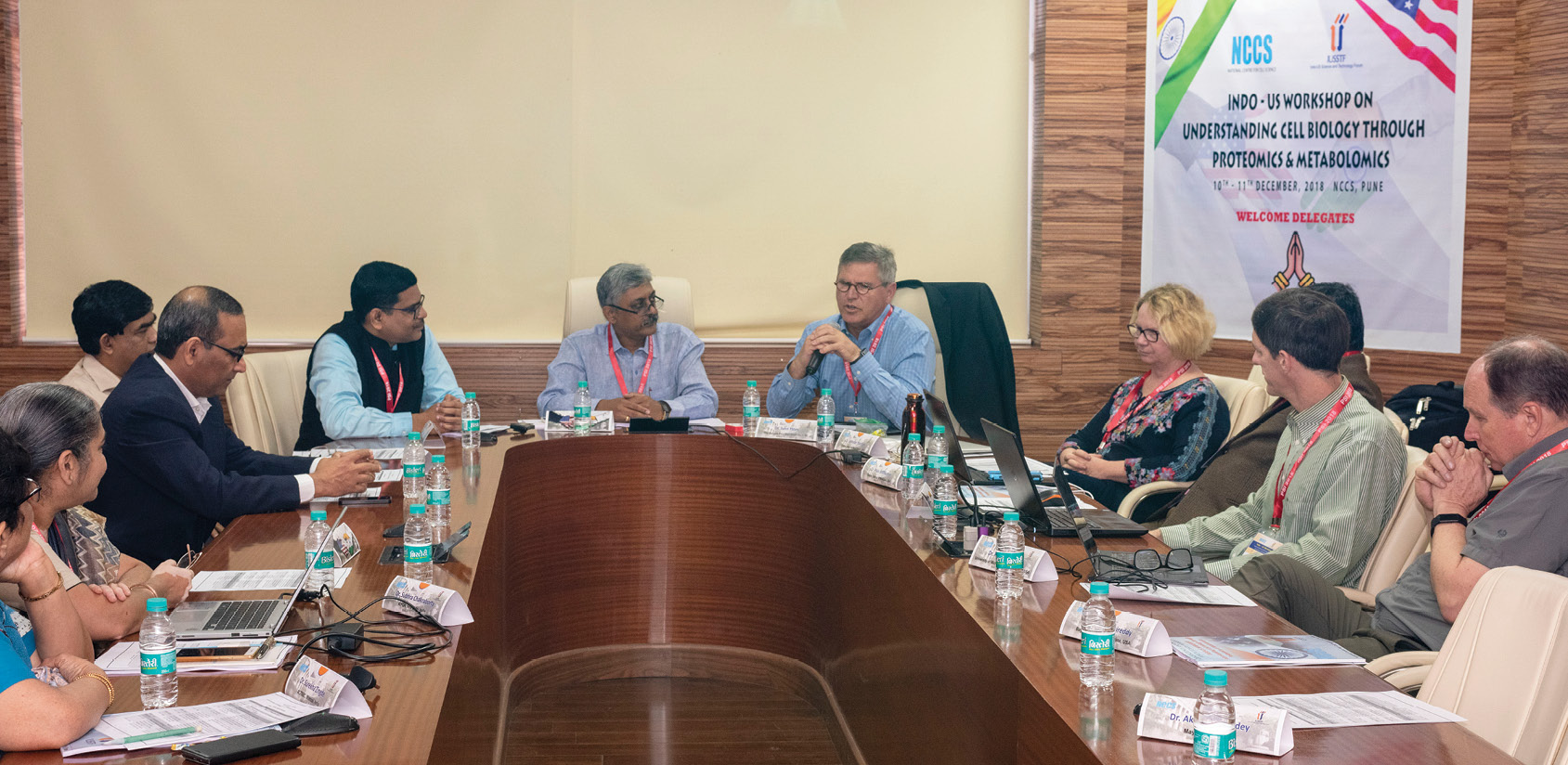
Proteomics and metabolomics are emerging technologies used worldwide to answer key questions in cell biology research. However, these technologies are rapidly advancing with new applications in cell biology and there is a need for frequent updates to keep pace with fields. The Indo-U.S. workshop on
Understanding Cell Biology through Proteomics and Metabolomics organized by
Srikanth Rapole (National Centre for Cell Science, Pune),
John R. Yates III (The Scripps Research Institute, La Jolla), Shantanu Sengupta (Institute of Genomics and Integrative Biology, New Delhi) and
Arun Sreekumar (Baylor College of Medicine, Houston) aimed at bringing together Indian and U.S. researchers working in the areas of proteomics and metabolomics under one umbrella to exchange scientific ideas and foster future collaborations.
Advanced instrumentation and computational techniques for Nuclear Reactor Safety
15-19 December 2018
IIT-Bombay, INDIA
Nuclear power is considered a critically important means of energy generation throughout the world, but due to high safety standards and process regulations, the cost of energy generation from nuclear fuel is much higher than natural gas-based energy generation systems. Advanced sensors and modeling techniques can dramatically improve the nuclear reactor safety while making the design of the nuclear plants simple. With the recent advances in material science, computational science, and artificial intelligence, there are ongoing development efforts in making robust sensors and computational data-driven techniques for achieving simpler designs, online reactor safety characterization, and accident management. This is a highly inter-disciplinary field and is rich in multiple, coupled physical phenomena ranging over wide length scales and time scales. The workshop titled
Advanced instrumentation and computational techniques for Nuclear Reactor Safety organized by
Suneet Singh (Indian Institute of Technology Bombay, Mumbai) and
Hitesh Bindra (Kansas State University, Manhattan) aimed to provide the forum necessary to synthesize such recent discoveries into clear predictions for other regions and directives for future work.
Indo-U.S. Symposium on Allergy and Asthma
15-16 December 2018
New Delhi, INDIA
Atopic conditions such as eczema, allergic rhinitis, asthma, and allergies are becoming more prevalent around the world. These conditions are related through a phenomenon known as the “atopic march” where children have increased risk of developing asthma and allergies if they are diagnosed with eczema early in life. Occurrence of asthma, environmental allergies, and eczema has risen over the last few decades and remain prevalent. An emerging, worldwide trend of increasing food allergy (FA) prevalence has become a growing public health concern. In the U.S., FA affects 8% of children. FA may also slowly be on the rise in India, especially in urban areas but there is a lacuna in its awareness and monitoring. Despite the increasing prevalence of FA worldwide, factors contributing to this increase are not definitively understood. The
Indo-U.S. symposium on Allergy and Asthma organized by Randeep Guleria (All India Institute of Medical Sciences, New Delhi),
Ruchi Gupta (Northwestern Feinberg School of Medicine, Chicago),
Vartika Mathur (Sri Venkateswara College, Delhi University) and
Lucy Bilaver (Northwestern Feinberg School of Medicine, Chicago) aimed to present the differences in prevalence and trends of atopic conditions in the U.S. and India; understand the biology of the development of atopic conditions; discuss factors that may impact atopic conditions and their relationship to the microbiome - hygiene hypothesis, timing of infant food introduction in different cultures, diet influenced by geographical location and culture, genetics, environmental exposures, pre- and postnatal risk factors, etc.; explore emerging microbiome research to determine factors contributing to and protecting against atopic conditions in India and the U.S.; and, enhance existing Indo-U.S. partnerships in the field of atopic conditions and the microbiome.

